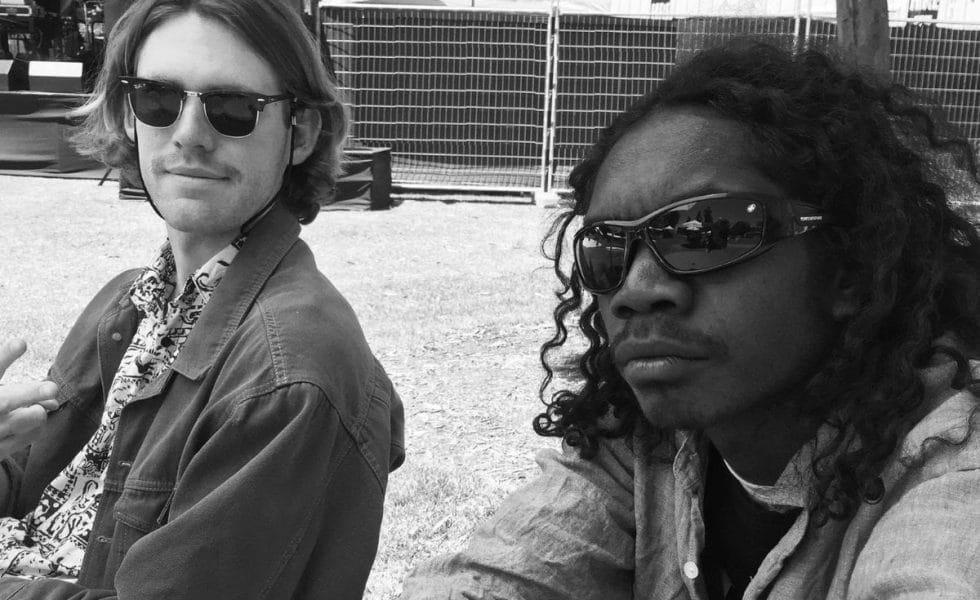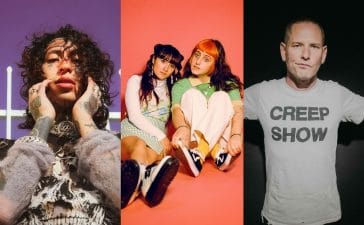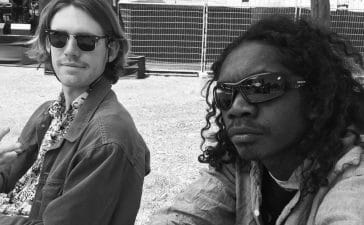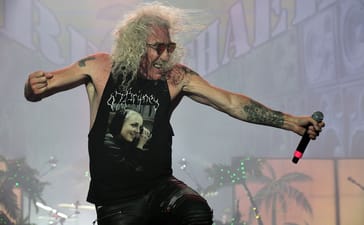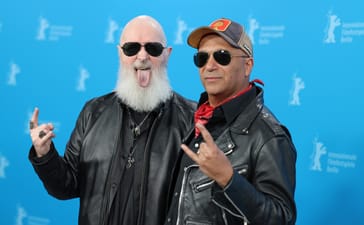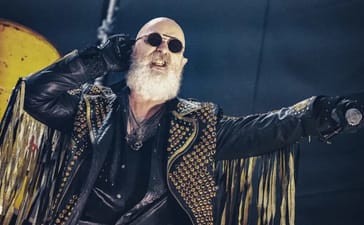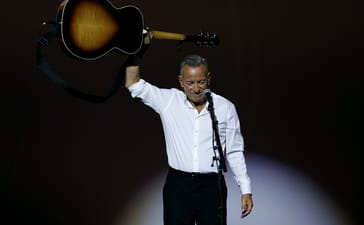Formed by Yirrŋa Yunupiŋu (nephew of the late Dr M Yunupiŋu – Yothu Yindi frontman) and Roy Kellaway (son of Stu Kellaway – Yothu Yindi founding member and bassist), King Stingray really are one of a kind. Blending Indigenous melodies with their rock influences, their unique Yolŋu surf rock pays tribute to their culture in a way that has been celebrated scene-wide, especially with their signing to The Chats’ Bargain Bin Records this year. With their new single ‘Hey Wanhaka’ out now, we caught up with Roy Kellaway to learn about his plans for the project.
Would you mind just giving me a short history of how the band King Stingray came together?
So King Stingray is, I suppose it can be described as a follow-up of the iconic Yothu Yindi band, but it’s the new generation. So, this is a project of myself and Yirrŋa Yunupiŋu, who’s the nephew of the late Dr. M. Yunupiŋu, Yothu Yindi front man. And my old man was founding member Stu Kellaway, who formed that band with Dr. M. back in the day. With our family being in a band like that, we always had aspirations to play music and celebrate culture much like our mentors in our family in that band. And then this band got formed off the back of touring with Yothu Yindi, and Yirrŋa and I started touring with them as members in the last three years. And we just had the ambition to do our own stuff, obviously. And we had the time to jam and work on songs over those few years on the road, on tour… But we’ve been working on this for a long while, just as brothers playing music together. So nothing ever really seriously until the last couple of years. But we grew up together, playing music together in other bands and stuff. I suppose the last 12 months to a year have been where we’ve brought it to life with recording the songs.
So, there are more songs to come. Is there an album on the way?
Well, we have another single coming out in January and we will have a bunch of clips coming out and a bunch more singles to come out throughout next year. So, we’re really looking forward to next year to share all of these new songs with everyone that will be singles off the upcoming debut album.
I wanted to ask about how this music is received by your community and its traditional members. Do they get into it or would they prefer you to be all the way traditional?
That’s a good question. I suppose being Yolŋu culture, the singer, the songsman often holds a lot of power. So, by being the spokesperson comes a lot of responsibility and Yirrŋa is that person. He’s born into it through his talent, through his clan, his bloodlines. He’s basically… He’s got the power in his voice. The community of Yirrkala, so much talent is coming out of that community, such a small community, but so many artists coming out of the Northern Territory and particularly that area. Will Stubbs, who runs the art centre there, plays a huge role in community, in the arts enterprises, basically for everyone. So, he’s just one and I could list so many names, but there’s just lots of people up there that really do support music.
But back onto this traditional thing, is it’s celebrating culture. And it’s in a way, a little bit along the lines of what Yothu Yindi did. Is it’s celebrating Yolŋuculture to the world through blending our own genre of what music we like to play as well. Yirrŋa integrates traditional Yolŋu Songlines, the manikay to very, very old melodies. And he integrates these into the music that he likes, which is surf rock and rock and roll, influenced by other artists that we really like, like Warumpi Band. I can’t talk on behalf of other people and how they might feel about it. Is that what you’re curious about or are you curious about whether the fact that our music is Yolŋu mixed with contemporary is going to be upsetting people? Is that what you mean?
No, not upsetting. Just maybe confusing.
Yeah, because it is straying away. It’s a really good question actually, because Yolŋu culture is one of the strongest and oldest cultures in the whole world. And the reason why it is so strong is because it has a very strict protocol. So with the language and everything to do with the culture, it’s very strict and not a lot of things stray far from the protocols. So, protocol was followed as per the book. It’s not really encouraged to do things too outside of what is culturally the right way. We’re not straying in a bad way. We’re just celebrating and broadening the reach that this culture has to inform and incite people really. It’s not changing anything that’s… I suppose, it’s not dramatically changing things. It’s just putting these melodies into the music that we like to play without getting too political. Because we’re just young fellas from the Bush playing music that we enjoy and celebrating the culture of Yolŋu and celebrating multiculturalism in Australia. So, we’re not trying to push a political agenda, if that makes sense.
That is so nice of you. I feel like if I was from an Indigenous community, I would be really angry. I also feel like there are people who try to speak on behalf of Indigenous communities that make me angry. But, you don’t seem like a very angry person.
We’re celebrating and trying to uplift everyone, all people, all humans. Through Yirrnga’s songwriting, he is a big advocate for human rights and social justice and social welfare. And when we supported Pussy Riot, a famous band from Russia, when we played with them with Yothu Yindi last year, I think it was, was just such a memorable experience for us because that is the political activism, in their way. It was a really exciting time because it was a free West Papua Movement. And we had a lot of West Papua dances with Yothu Yindi. We merged this Yolŋu and West Papua segment. It was a really amazing experience for me. And getting all of us young fellows introduced to some really cool people in the world who are doing some awesome things. Little things like that really shape us to play our role…To fight a good fight but in a celebratory way.
You’ve mentioned that you were in Brisbane. What is the land that you come from? Yolŋu, that’s North-East Arnhem Land, right?
I’ve just moved to Brisbane in the last few years for work. So, I was born and raised up in Yirrkala, which is North-East Arnhem Land. Yolŋu people. I’m just here for work at the moment.
Do you miss your community?
I definitely am missing it. And I think being away from it makes you realise how beautiful and special it is even more.


